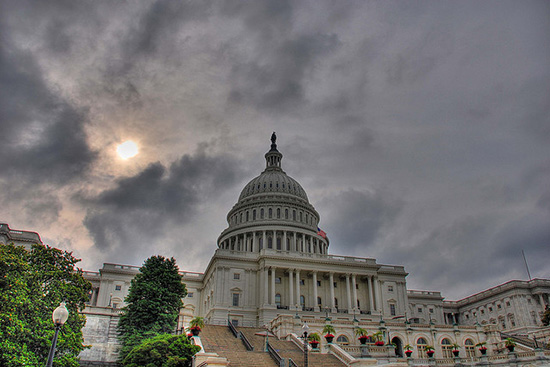Federal Shutdown Shuts Down Some BU Research
D.C. brawl touches Boston

The stalemate in Washington, which has shuttered parts of the federal government, has forced work stoppages on some BU research. Photo courtesy of Flickr contributor l’ennui d’ennui
Alan Jette has been trying to save the government a little money. The School of Public Health professor has been researching cost-effective ways to assess applicants claiming work disabilities so that they can receive Social Security benefits.
But his research has been halted by, um, a putative attempt to save the feds money.
“We have been asked to stop that work” as a result of the government shutdown, says Jette, a professor of health policy and management and director of the Health & Disabilities Research Institute, who had been collaborating with both the Social Security Administration and the National Institutes of Health. “We meet on a regular basis with our collaborators. But they’re all gone…furloughed, and they’ve been told they can’t use their emails. It has set back our work. It’s absolutely delayed everything.”
The shutdown, resulting from a standoff between President Obama and some congressional Republicans who have demanded he kill or delay his health reform law, has prompted full or partial stop-work orders on about seven BU research projects, including Jette’s, says Andrew Horner, vice president for research finance and operations. Among the affected efforts is the famous Framingham Heart Study (FHS), already reeling from the automatic spending cuts known as the sequester and federal policy changes. The study, begun in 1948 and run by BU since 1971, is the nation’s oldest large-scale study of cardiovascular disease.
The FHS is in the final weeks of studying offspring of the original participants, as well as minority participants. “Dozens of scheduled appointments for subjects from out of town have had to be canceled since the shutdown began” two weeks ago, says principal investigator Philip Wolf, a School of Medicine professor of neurology and a School of Public Health professor of public health. “This has created a significant hardship, since these subjects include participants who are the least likely to attend and the most difficult to encourage, as they are typically elderly and less well.”
Robert Kennedy got a full stop-work order for his work through the US Geological Survey capturing space-based views of Earth’s landscapes and studying how humans and nature change them. Projects with other agencies are continuing, but like Jette’s, Kennedy’s research is hampered by the unavailability of federal collaborators and data, says the College of Arts & Sciences assistant professor of earth and environment.
With deadlines approaching, “Each day of continued closure causes increasingly detrimental effects,” Kennedy says.
At least one affected researcher says the hit to his work has been minimal. Daniel Miller, a School of Social Work assistant professor, is part of a multi-institution project studying how the involvement of fathers who don’t live with their children can affect food insecurity for those children.
His project analyzes existing data, Miller says, obviating the need to pay for subjects or additional materials. Also, the project is scheduled to end in December, and he is spending less time on it. The one outstanding question, he says, is whether he and his collaborators will have federal money to travel to a conference next month to present their results.
Most non–University-funded research at BU is through grants, and those are proceeding, although some routine work has had to stop because the shutdown has idled federal personnel and administrative systems, Provost Jean Morrison wrote in an email last week to the BU community. But the University also has research that’s funded through 25 to 30 contracts with various agencies, representing “not a small dollar amount,” Horner says. Of those, “we have approximately seven contracts that received partial or full stop-work orders.”
Student recipients of federal financial aid would not be affected by the shutdown, according to Morrison. Active duty military personnel and veterans who have been approved for tuition assistance will receive the money, but the government closure has stalled applications for new benefits, she wrote.
Gloria Waters, vice president and associate provost for research, emailed researchers earlier this month with advice on what they could and could not do, depending on their government funding source–a tricky task, she wrote, as agencies’ information kept changing, and “each agency has provided separate guidance related to ongoing activities during the shutdown.”
Senators Monday scrambled to approve a deal that would reopen the government until January 15 and lift the debt ceiling—another battle between Tea Party Republicans in Congress and Democrats there and in the White House—until February. House Republicans meanwhile were stymied yesterday in coming up with their own plan.
Even temporary funding “would be preferable to the shutdown,” Wolf says, but the FHS “requires a clear path for research project planning and execution, and stopping and starting is a major problem.”
Congress has agreed to pay furloughed federal workers retroactively to October 1, the start of Uncle Sam’s fiscal year. “However, it’s unclear if that legislation will carry over to contracts,” says Horner. Once the shutdown ends, “we have some expectation that the government will make us whole, retroactive to October 1, but I wouldn’t take any money to the bank” on that.
In a statement cosigned by various education leaders, the Association of American Universities, a research consortium that admitted BU last year, decried the shutdown and looming debt default for their economic and human toll. “This stalemate threatens to exacerbate the cynicism Americans already feel about the function and importance of their government,” the statement says.
Comments & Discussion
Boston University moderates comments to facilitate an informed, substantive, civil conversation. Abusive, profane, self-promotional, misleading, incoherent or off-topic comments will be rejected. Moderators are staffed during regular business hours (EST) and can only accept comments written in English. Statistics or facts must include a citation or a link to the citation.